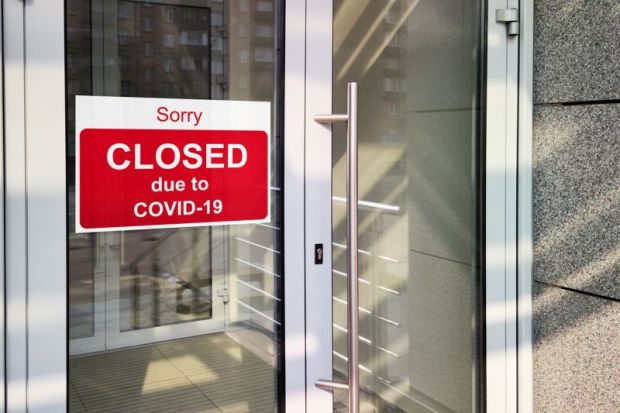In the new world of the coronavirus, planning is a difficult game. The University of Bolton has enlisted airport-style temperature scanners, a massive bicycle loan scheme and carefully choreographed timetables as part of its reopening measures, but now it must modify them again, after the area became subject to a local lockdown.
On 8 September, tighter coronavirus restrictions were introduced in Bolton after a spike of cases. It means that hospitality for food and drink is now restricted to takeaway only, all venues must be closed between the hours of 10pm and 5am and it is illegal for people to socialise with those outside their own household in any setting, even outdoors.
Although the university, like all UK institutions, had put in place many new safety measures in light of the pandemic, the new restrictions are much tighter.
George Holmes, Bolton’s vice-chancellor, said that the university would go ahead with its reopening, because the rules mean that students are still permitted to attend in-person learning, as long as they are wearing a mask and are 2m apart. The university had already installed large Perspex screens in lecture theatres and will require all staff and students to wear masks, unless medically exempt, across campus.
The institution will now erect “tent villages” in the outdoor areas of campus. “These might take 300-400 people under normal circumstances but now around 60 or 80. So, you are able to offer takeaway coffees and sandwiches and sit and still be safe, those are being put up all over campus right now. If we have green space, we will fill it with a tent village,” he said.
It will also be offering a university equivalent to Deliveroo. “If you arrive at Bolton you will put in a bubble of six in a hall, that is your new family now. You can’t meet anyone else but them socially, that’s it for the moment,” he said. “What we are doing is using our catering staff who normally cook on campus, as we’re now only doing pre-packaged sandwiches there, to create meals that can be delivered to the halls for £1. We’re not doing massive menu choices, but it allows them to come together in the bubble and enjoy something,” he explained.
The students’ union will be closed for socialising, although it will be open for student counselling and students can make an appointment to get advice from their “mentors”, which will be conducted through a plastic screen.
Professor Holmes explained that the university had been planning for many different scenarios, including more local or national lockdowns or even an outbreak on campus.
“We’ve already spent more £1 million on measures on campus to get ready for opening and this requires more funds again. Universities are paying for it at the minute, but clearly the safety of students and staff matter,” Professor Holmes said. “And you have to prove to the population that you are going that stage further to ensure you are not creating infection and passing things on.”
A lot of the rhetoric about the increasing numbers has focused on young people socialising. On 8 September, health secretary Matt Hancock told the House of Commons that the “rise in cases in Bolton is partly due to socialising by people in their 20s and 30s. We know this from contact tracing.”
Professor Holmes said that the university was communicating clearly with students. “We are taking our responsibility seriously. Every student has to register on our app that will highlight the behaviours needed in this current lockdown,” he said. “We are telling students very clearly that anyone who steps out of line and is found at a major house party, for example, will be asked to leave the university. We can’t do with students flouting the regulations and getting away with it.”
The university has also tapped into previous crisis experience, he added. Last year a huge blaze broke out at a university student accommodation block displacing about 200 students. “Luckily, the student union president who had to deal with that has been re-elected and knows how to deal with crisis. He’s seen as quite a thought leader; he has credibility on campus and he is advocating ‘you have to be careful, respond properly, don’t break those regulations or we could all lose our education’, and the students do listen.”
Register to continue
Why register?
- Registration is free and only takes a moment
- Once registered, you can read 3 articles a month
- Sign up for our newsletter
Subscribe
Or subscribe for unlimited access to:
- Unlimited access to news, views, insights & reviews
- Digital editions
- Digital access to THE’s university and college rankings analysis
Already registered or a current subscriber? Login








